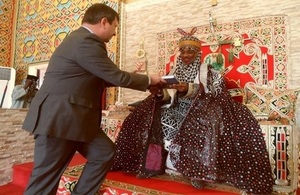British High Commissioner rounds up visit to Kano
British High Commissioner to Nigeria, Paul Arkwright, made his first visit to Kano State from 19-21 January, during which he engaged with key leaders and civil society organisations, as well as witnessing the work of the UK Department for International Development (DFID).

The British High Commissioner , Paul Arkwright was hosted to a reception at the Emir's palace
British High Commissioner to Nigeria, Paul Arkwright, made his first visit to Kano State from 19-21 January, during which he engaged with key leaders and civil society organisations, as well as witnessing the work of the UK Department for International Development (DFID).
On Tuesday January 19, he paid a courtesy call on His Excellency the Executive Governor of Kano State, Governor Abdullahi Ganduje, at Government House. The discussions were wide ranging, covering the breadth of UK involvement in Kano State and northern Nigeria, and the High Commissioner expressed his gratitude for the vital support of the Governor for the widespread DFID work in the State.
In keeping with the strong UK-Emirate relationship, on the same day the High Commissioner was treated to the great honour of a formal reception at the Palace of the Emir of Kano, His Royal Highness Sanusi Lamido Sanusi II. The High Commissioner and the Emir discussed the Nigerian economy, DFID’s development work, and the state of interfaith relations in northern Nigeria.
The High Commissioner visited two DFID programmes operating in Kano State, one supporting maternal and child care, and the other focusing on primary education. Over 200 clinics in Kano State alone benefit from DFID programme support in conjunction with the State Government. Education Sector Support Programme in Nigeria (ESSPIN) is one of the DFID funded programmes in Kano supporting Kano State Government in improving access, quality of education, and efficient utilisation of Kano State resources at the state, community and school levels. The programme is currently supporting over 5,842 public pre-primary and primary schools with over 2.9m pupils in 44 LGAs with School Improvement Programme (SIP) which consists of Teaching Skill Programme (for teacher professional development, Head Teacher training), School Base Management Committee (SBMC) training, and piloted school infrastructure programme (provision of borehole water and toilets)
The High Commissioner also visited Bayero University Kano (BUK), where he was received by the Vice Chancellor who stressed the role of the UK in BUK’s founding. The Vice Chancellor informed the High Commissioner of the continued importance BUK places on its links to the UK, where many of his staff are pursuing PhDs. The High Commissioner also visited the Active Citizens Project, supported by British Council, a social leadership training programme that trains participants in the skills and knowledge needed to affect social change in their communities. Active Citizens is running at universities across Nigeria and in 30 other countries.
During the visit the High Commissioner also visited the Gidan Makama museum, which holds historical records of the Kano Emirate. There was also a courtesy call on Alhaji Yusuf Maitama Sule, Dan Masanin Kano, an elder statesman and former minister, and now chair of the Northern Elders Forum.
The High Commissioner was accompanied on his visit by staff from the Political section of the British High Commission Abuja and the DFID northern Nigeria team.